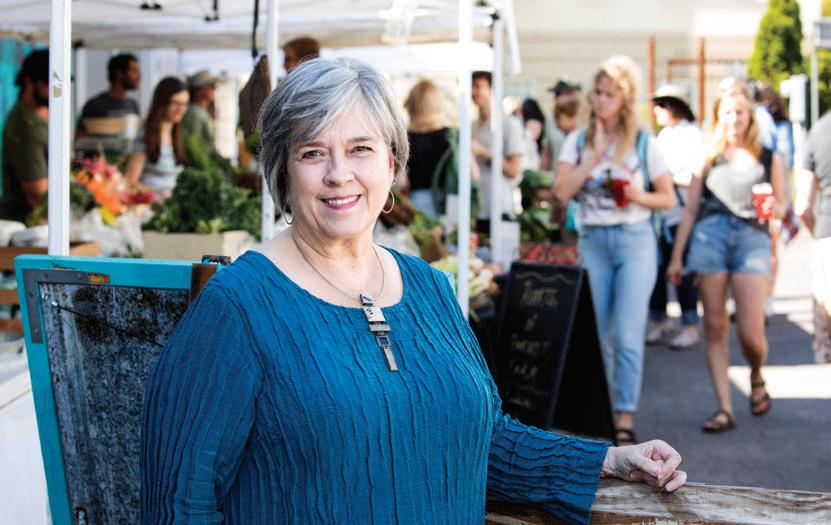
4 minute read
Change in the Air
Meet New College of Public Health Dean Marsha Davis

Dean Marsha Davis
Photo by Dorothy Kozlowski, 2019.
What is public health? It’s a question Marsha Davis has heard many times over her career, and the answer is both simple and complex.
“We say ‘everything is public health,’ and that’s because we know there is so much that can impact the public’s health – from access to healthy foods to affordable healthcare, but we have come to understand that health is also influenced by community-wide factors,” said Davis.
And it’s working to address the needs of communities, in Georgia and around the globe, that motivate Davis as she steps into the office of dean at the University of Georgia College of Public Health.
TAKING ROOT
It was the community work that first attracted Davis to public health, a passion she learned from her father, who worked as a carpenter in rural Siler City, North Carolina.
“He taught me the values of community work and that everyone has a part in that regardless of where you are coming from in your own culture, beliefs or life experiences,” said Davis. “It’s walking in the shoes of other people that is important to understand in public health.”
Over her career, Davis has led multiple landmark community-based programs aimed at improving the health of children and their families.
Initially trained as an educational psychologist, Davis began a pre-doctoral fellowship in epidemiology at the University of Minnesota where she brought her background in research methods and evaluation to the Minnesota Heart Health Program.
“Evaluation’s roots are in educational psychology,” she said. “The research methods that are used in community-based studies come from education, though they have been furthered in public health.”
Davis continued to design and evaluate community-based health promotion programs as a faculty member at Emory University’s Rollins School of Public Health and again as part of the faculty at Minnesota, where she chaired the maternal and child health program and continued her research in nutrition and physical activity programs for children and their families in various communities and populations.
WORKING FOR GEORGIA’S COMMUNITIES
In 2006, Davis arrived at the University of Georgia College of Public, and she was inspired by the commitment to serve Georgia’s communities has the state’s flagship and land-grant university.
“We have a responsibility to serve all 159 counties in the state,” said Davis. “Our work can make a real difference at the local, grassroots level.”
Another key aspect of the college’s presence in communities throughout the state is that it is uniquely positioned to identify the most pressing public health challenges faced by our communities, especially rural communities, and mobilize efforts to and address them.
And the challenges are great. Georgia has the highest maternal mortality rate and is ranked among the top ten worst in the country on infant mortality rates. The uninsured rate hit 13.4% in 2018, and rural communities have been hit especially hard by provider shortages and hospital closings.

While at UGA, Davis has been awarded more than $15 million from federal agencies such as the National Institutes of Health, Centers for Disease Control and Prevention, and U.S. Department of Agriculture to address health issues in Georgia.
Her work has contributed to an improvement in health rankings for a number of counties and a significant economic impact for the state.
Davis’ commitment to serving the state led to her being named as the College’s associate dean for outreach and engagement in 2013, a role in which she coordinated efforts aimed at building the capacity of Georgia’s public health workforce and fostering partnerships to improve community health.
Davis is responsible for founding and organizing the College’s annual State of the Public’s Health (SOPH) Conference and the UGA Public Health Leadership Academy (PHLA).
Davis is also seeking to build further research and outreach collaborations within the College of Public Health and with other schools and colleges across campus.
Today’s major public health issues can only be addressed through a multi-sector and multi-disciplinary approach, said Davis.
“Take maternal and child health, for example. We need research contributions from epidemiology, health promotion and behavior, pharmacy, medicine, social work and others to find solutions to lowering Georgia’s high maternal and infant mortality rates,” she said.
BUILDING PROGRAMS FOR NOW
Learning to collaborate and problem solve with a team will be critical skills for the next generation of public health leaders. Innovating the education experience for public health students is another priority for Davis.

“We will need to instill these competencies through more project-based study, more experiential learning,” she said.
As dean, Davis will once again bring her talent for evaluation to the table as the college looks ahead.
“Evaluation really is about making data-driven decisions for program improvements, and that’s what I want to bring to the college,” she said.
Nationally, MPH enrollment is plateauing, while bachelor’s degrees are on trend to overtake the master’s degrees – a trend Davis is already observing at UGA.
Generation Z students are interested in an education they can apply and are focused on the value of a degree, she said.
“We have to create a curriculum that emphasizes the human, data, and technology skills public health students need to enter the workforce and make immediate impacts on the communities they serve,” she said.
An integrated curriculum, digital badges, stackable certificates, and ‘MicroMasters’ will be needed and will be in demand, she added.
Ultimately, Davis’ hope is to prepare students to do the work of public health while encouraging their personal passions and purpose to make a difference.
“It’s about making healthier lives possible for all people,” she said. “That is public health.”

The SOPH Conference, now in its eight year,serves as College’s signature outreach event, connecting UGA faculty to public health leaders and workers throughout the state and also providing a place to discuss priorities and strategies for improving public health in Georgia.










